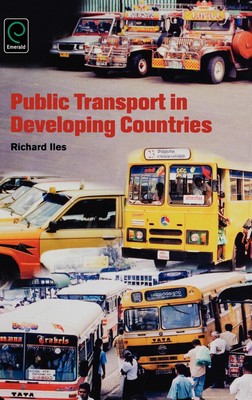
- Išsiųsime per 12–18 d.d.
- Autorius: Richard Iles
- Leidėjas: Elsevier Science Ltd
- ISBN-10: 0080445586
- ISBN-13: 9780080445588
- Formatas: 17 x 23 x 3.4 cm, kieti viršeliai
- Kalba: Anglų
- Extra -15 % nuolaida šiai knygai su kodu: ENG15
Atsiliepimai
Aprašymas
Numerous books have been written which deal with transport problems in developed and developing countries, and with the planning and management of transport organisations in developed countries, but none deals specifically with the planning, regulation, management and control of public transport in developing countries. This book meets that need. It examines and explains the problems and characteristics of public transport systems in developing countries, and discusses the alternative modes, management methods, and forms of ownership, control, regulation and funding, with particular emphasis on what is appropriate at different stages of development and for different cultural backgrounds. It deals with urban, rural and long distance transport services, principally by road. This emphasis reflects the magnitude of the urban transport problem, and the predominance of road transport in most developing countries. The planning of bus services, particularly in urban areas, is covered in some detail, since this is often an area of considerable weakness. Similarly, the management of transport services and the maintenance of vehicles, including vehicle design and transport fleet planning, are also dealt with in depth. The book is aimed at all those who are involved in the provision of public transport in developing countries, including transport planners, managers of transport undertakings, aid agency and government officials responsible for the funding, provision or regulation of transport, transport consultants and advisers, and in particular students of transport or urban and rural affairs. Since there is much in common between transport operations in the developing world and in developed countries, this book should be of interest to transport operators and planners everywhere. The book is unique in that it provides a comprehensive overview of all the factors involved in planning, establishing, organizing and regulating public transport services in a developing country. It deals with the environment in which transport services are operated, in particular infrastructure requirements, road traffic management, regulatory and institutional frameworks and enforcement of regulations; it highlights the importance of an appropriate environment in order to facilitate the provision of public transport services, and shows how such an environment may be achieved. It deals in detail with all aspects of running a bus service in a developing country: the chapters on management are specific to a public transport operation and could be used as an "operator's manual", providing a valuable supplement to a more general management textbook. The book provides useful statistics and performance indicators which will be valuable as benchmarking tools. While acknowledging that the same solutions are not necessarily applicable everywhere, the book provides useful pointers to solutions to the main problems encountered in providing public transport services in developing countries.
EXTRA 15 % nuolaida su kodu: ENG15
Akcija baigiasi už 10:24:12
Nuolaidos kodas galioja perkant nuo 5 €. Nuolaidos nesumuojamos.

- Autorius: Richard Iles
- Leidėjas: Elsevier Science Ltd
- ISBN-10: 0080445586
- ISBN-13: 9780080445588
- Formatas: 17 x 23 x 3.4 cm, kieti viršeliai
- Kalba: Anglų
Numerous books have been written which deal with transport problems in developed and developing countries, and with the planning and management of transport organisations in developed countries, but none deals specifically with the planning, regulation, management and control of public transport in developing countries. This book meets that need. It examines and explains the problems and characteristics of public transport systems in developing countries, and discusses the alternative modes, management methods, and forms of ownership, control, regulation and funding, with particular emphasis on what is appropriate at different stages of development and for different cultural backgrounds. It deals with urban, rural and long distance transport services, principally by road. This emphasis reflects the magnitude of the urban transport problem, and the predominance of road transport in most developing countries. The planning of bus services, particularly in urban areas, is covered in some detail, since this is often an area of considerable weakness. Similarly, the management of transport services and the maintenance of vehicles, including vehicle design and transport fleet planning, are also dealt with in depth. The book is aimed at all those who are involved in the provision of public transport in developing countries, including transport planners, managers of transport undertakings, aid agency and government officials responsible for the funding, provision or regulation of transport, transport consultants and advisers, and in particular students of transport or urban and rural affairs. Since there is much in common between transport operations in the developing world and in developed countries, this book should be of interest to transport operators and planners everywhere. The book is unique in that it provides a comprehensive overview of all the factors involved in planning, establishing, organizing and regulating public transport services in a developing country. It deals with the environment in which transport services are operated, in particular infrastructure requirements, road traffic management, regulatory and institutional frameworks and enforcement of regulations; it highlights the importance of an appropriate environment in order to facilitate the provision of public transport services, and shows how such an environment may be achieved. It deals in detail with all aspects of running a bus service in a developing country: the chapters on management are specific to a public transport operation and could be used as an "operator's manual", providing a valuable supplement to a more general management textbook. The book provides useful statistics and performance indicators which will be valuable as benchmarking tools. While acknowledging that the same solutions are not necessarily applicable everywhere, the book provides useful pointers to solutions to the main problems encountered in providing public transport services in developing countries.




Atsiliepimai